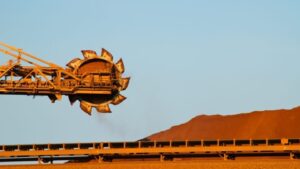Santos has become the latest Australian gas company to write off the value of its gas investments, announcing that it expects to record a $1 to $1.1 billion impairment as a result of a crash in global oil and gas prices.
Santos revealed the impairment in a statement to the ASX on Tuesday, telling investors that due to a collapse in global oil prices, caused by Covid-19 triggered falls in energy consumption and which has flow-on effects on gas prices, it was forced to write down the value of its investments in the Gladstone LNG project.
Many companies, including Santos, had made investments in new oil and gas projects under the assumption that global oil prices would remain above $60 per barrel.
However, since the start of 2020, the combined effects of a Russian-OPEC price war and Covid-19 related disruptions, has sent the Brent crude oil price plummeting, at one point reaching negative prices. Oil prices have since stabilised at around $40 per barrel, forcing companies to revise down the value of the investments due to lower expected revenues.
The collapse in the oil price has direct consequences for the Asian gas market, with many contracts for gas based on prices that are pegged to global oil prices.
Santos joins a growing list of gas companies that have been forced to write off the value of gas investments in the wake of the Covid-19 outbreak.
Origin Energy indicated it would write-off $1.2 billion in value relating to two of its LNG investments earlier in July. This followed Woodside recording its own $6.3 billion hit.
The list of fossil fuel companies hit by Covid-19 related impacts has continued to grow. Oil Search announced its own impairment of up to $570 million. Ampol Limited (previously Caltex Australia), declined to issue a profit guidance to shareholders in June, citing both the Covid-19 pandemic and market volatility as creating too much uncertainty.
Global energy giant Shell recorded a massive $22 billion write-down on its oil and gas investments, including $8- $9 billion related directly to its Australian based projects.
Smaller players have also been impacted, with Strike Energy recording a $91 million impairment on its Cooper Basin gas project.
Chevron, the largest investor in Australia’s oil and gas market, has yet to indicate what level of impact recent developments have had on its own business.
As a conservative estimate, the amount of reported Australian investment losses in the oil and gas sector has amounted more than $18 billion during the first half of 2020. This estimate excludes losses recorded by privately held companies that do not have the same public disclosure obligations of publicly listed companies.
Investor advocacy group the Australasian Centre for Corporate Responsibility said that the write-downs are some of the clearest indications that fossil fuel assets are starting to become stranded.
“Today’s writedown by Santos – on the back of Royal Dutch Shell, Woodside and Origin writedowns – is a clear demonstration that oil and gas assets are being stranded right now,” ACCR director for climate and environment Dan Gocher said.
“Santos is prepared to sacrifice the climate and local communities on the slim chance that the Narrabri gas field may be profitable in the hope that business conditions improve. These gas assets will eventually be stranded. Santos must see the writing on the wall and abandon the Narrabri project before burning any more shareholder capital.”
It is a powerful indication of the amount of financial resources that have been lost by the oil and gas industry during the Covid-19 triggered economic crisis, and how much of a drag the sector has been on the Australian economy, rather than a contributor to recovery.
There has been a chorus of calls from the clean energy sector for stimulus measures to be directed towards investment in new renewable energy, energy efficiency and storage projects, but the Morrison government has ignored these calls.
The Climate Council released its own “Clean Jobs Plan” on Tuesday, outlining a series of 12 potential measures where investments in clean energy projects could create as many as 76,000 new jobs over the next three years.
“Australia has seen steep job losses throughout the COVID-19 pandemic. But with the right policy measures, thousands of jobs could be created in large-scale renewable energy, ecosystem restoration and the collection and processing of organic waste,” AlphaBeta Director, Andrew Charlton, who worked with the Climate Council to produce the Clean Jobs Plan said.
“Most of the 12 stimulus options can leverage significant private investment for the Australian economy. Investment in pilot-scale green hydrogen facilities would unlock $4 for every dollar of public money; utility-scale renewable energy unlocks $3 for every dollar invested,” non-executive director and Climate Council board member, Sam Mostyn added.
The Climate Council estimates that its plan would require around 0.5 per cent of Australian GDP in public investment, the equivalent of around $7.2 billion or around a third of what has already been lost by the gas industry.









